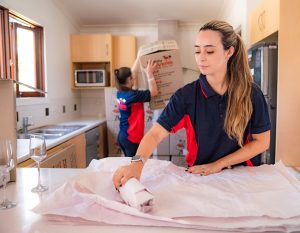Our housing needs change throughout our lives, including in our twilight years. Changes in our life circumstances, such as health issues or the death of a spouse, can lead us to seek new living arrangements that better suit our situations. Moving is a stressful endeavour at any age, but relocating in your senior years brings its own set of difficulties. Luckily, it can also be the start of a fulfilling new chapter in your life.
Older Australians move house for many reasons. Some want to be closer to family, some require the assistance that nursing homes and care facilities provide, and others just want to enjoy a change of scenery and a more relaxed way of life during their retirement years.
Whatever your motivation for your move, Ready Movers is here to help you take the stress out of it. With thousands of successful moves behind us, we’ve helped people from all walks of life relocate, including seniors. Here’s our guide to the challenges of moving house as an older person, our tips for a smoother transition, and how our team can help.
The Challenges of Moving House as a Senior
Moving house is an exhausting affair that can take its toll on your mental health, no matter your age. While the following challenges can affect anyone, Australians aged 65 and over may be particularly prone to experiencing them.
Physical and health limitations
As we age, mobility and physical strength decline. Health conditions can slow you down during a move and raise the risk of injury from an accident or overexertion. Moving house can affect you physically, causing issues like exhaustion, sleep deprivation, and back and muscle injuries. Older age and existing health problems increase your risk of these problems occurring.
Emotional issues
It’s common to feel mixed emotions about leaving an existing community behind to find a place in a new destination. The longer you’ve lived in the same area, the more anticipation you may feel about leaving behind friends, neighbours and memories for a fresh start in a new location. You may feel especially sentimental if you’ve spent many years or decades in the same place.
Storing or downsizing possessions
A lifetime of accumulating possessions can lead to a lot of clutter when it comes time to move. Some things you may be reluctant to let go of. Downsizing before a move often means drawing a distinction between keepsakes that you take with you to remind you of cherished memories and items that you can sell or donate.
Financial costs
Although downsizing or moving into a smaller home can save you money in the long run, moving is still expensive. Stretching your regular budget to include the costs of removalists, packing, materials, transport, storage, and more can feel close to impossible, especially if you’re retired and on a pension.
Finding appropriate housing
In recent years, the rate of home ownership has decreased among older Australians in line with the general population. Factors like job loss, health issues, divorce or the death of a spouse can increase the risk of homelessness later in life. Seniors may struggle to find housing that suits their healthcare requirements, mobility, access needs and lifestyle.
Options Available For Seniors Moving House

There’s no one way to move house. Like other demographics, older Australians have options available when it comes to relocating. Some of the most common choices seniors make include:
Moving into a new home
It’s common for older Australians to move into houses that better suit their needs. This doesn’t necessarily mean downsizing but can also take the form of “rightsizing,” choosing the home size that suits you, whether it’s larger or smaller. Some seniors, for example, benefit from extra rooms in their homes for visiting relatives or from increased areas of privacy. Other major driving factors are ease of maintenance and close proximity to services and resources.
Moving in with family
Living with family often provides benefits for older people, such as reduced costs, increased family time, and the capacity for round-the-clock care.
Moving into a retirement village or residential park
Living in a tight-knit residential community can provide a higher level of security, friendship and connection with others, as well as access to services and amenities. There are different ways to purchase and pay for a home in a retirement village, and it can be much more complicated than buying or selling other property, so it’s important to seek expert advice.
Applying for aged care
Both short-term and long-term residential aged care is an option for older Australians who can no longer live at home and need ongoing help with everyday tasks. Aged care services can provide personal care, counselling, and support, as well as access to health practitioner services, among other benefits.
There are two main methods an older person can choose from when moving house: coordinating the move yourself with the help of family or friends or hiring professional removalists.
How Family Members Make a Senior’s Transition Easier
If you’re the family member of an older person planning to move house soon, here’s how you can support them through this major change in their life. If you’re the one moving, these suggestions will help you, too.
Make a packing plan
Preparation is key, and the earlier you start, the better. Creating a packing plan for the older person in your life reduces the stress of it all. To start, make a checklist of tasks that need to be done before, during and after the move to keep you on track.
Gather the right materials
Choosing appropriate materials, such as bubble wrap, packing paper, and strong boxes, protects your older relative’s possessions (or your own) and offers peace of mind.
Help downsize
Reducing your possessions before you move is always a good idea, regardless of age. Help your older relative decide what they need to keep and what they can get rid of, and then offer practical help, e.g., holding a garage sale or donating unwanted goods to an op shop.
Help move
Both packing and moving itself are physically and mentally tiring experiences. The more hands that are available to help, the better. Take control of lifting and loading belongings and any other tasks that may be too dangerous for your older relative.
On moving day, pack a kit with essentials like medication, toiletries and important documents.
Provide emotional support
Moving is always a stressful time that can stir up strong emotions. Don’t underestimate how helpful it can be to be ready for a chat.
For Hassle-Free Removalist Services Hire Ready Movers

Ready Movers can take the stress out of moving house as a senior, carrying out the difficult tasks on your behalf. A trusted name in both local and interstate moves, we offer a fully insured pack and move service with your own dedicated move manager and a no-damage written guarantee on local moves.
With our professional packing services, we can supply packing materials, pack and unpack your entire house and do the heavy lifting. We also offer storage services if you need a temporary space for your possessions between houses.
For an easier relocation, contact the Ready Movers team and get a free moving quote.




